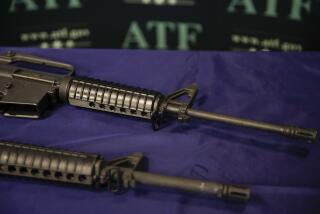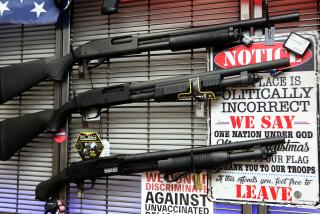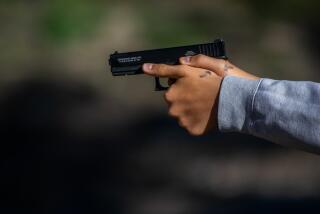Buying guns but not safety
For political theater, few things beat gun buyback programs such as the one held Saturday in Los Angeles. The resulting stacks of shotguns, rifles, handguns and even assault weapons make great TV and give the impression that politicians and police chiefs are putting a dent in the supply of dangerous firearms. It’s fodder for a slow news day and a harmless enough marketing ploy -- but really reducing gun crime requires more than feel-good exercises.
Mayor Antonio Villaraigosa, who instituted Saturday’s buyback, said Monday that it took more guns off the streets of L.A. than there were shooting victims in the city last year. That’s a highly misleading statement, implying a connection between gun homicides and the specific weapons handed in to police over the weekend. In truth, studies of municipal gun buyback programs have never turned up a shred of evidence that they reduce firearm violence.
It’s impossible to know how many guns there are in Los Angeles, in part because many are unregistered and illegally owned. But it’s estimated that there are about 258 million privately owned firearms in the United States (or nearly one gun for every American citizen), and there are about 3.8 million people in the city of L.A. So it’s safe to say that there are millions of guns hereabout. The 1,700 turned in Saturday did not significantly reduce the number.
What’s more, the guns that tend to be surrendered are very seldom the ones used by criminals. They are usually old, broken weapons turned in by older people who would rather have a $100 gift certificate to buy groceries (the premium offered Saturday to those who brought in guns) than a rusted revolver. A 2004 report by the National Research Council, an arm of the National Academy of Sciences, concluded that “the theory underlying gun buyback programs is badly flawed, and the empirical evidence demonstrates the ineffectiveness of these programs.”
And yet politicians never tire of proposing buybacks, which are universally popular -- even the most enthusiastic gun-rights proponents don’t object to them because no one’s guns are involuntarily seized or banned. Though the city of Los Angeles is relatively new to the game, L.A. County Sheriff Lee Baca has been holding gun buybacks for years and has reaped a publicity windfall. Also winning favorable PR are corporate sponsors such as the Ralphs supermarket chain, which partially underwrote Saturday’s buyback.
Really cutting down on the bloodshed will require meaningful legislation and tougher enforcement. That’s harder to pull off than a gun buyback program: Good PR almost invariably is simpler than good policy.
More to Read
Get the L.A. Times Politics newsletter
Deeply reported insights into legislation, politics and policy from Sacramento, Washington and beyond. In your inbox three times per week.
You may occasionally receive promotional content from the Los Angeles Times.










